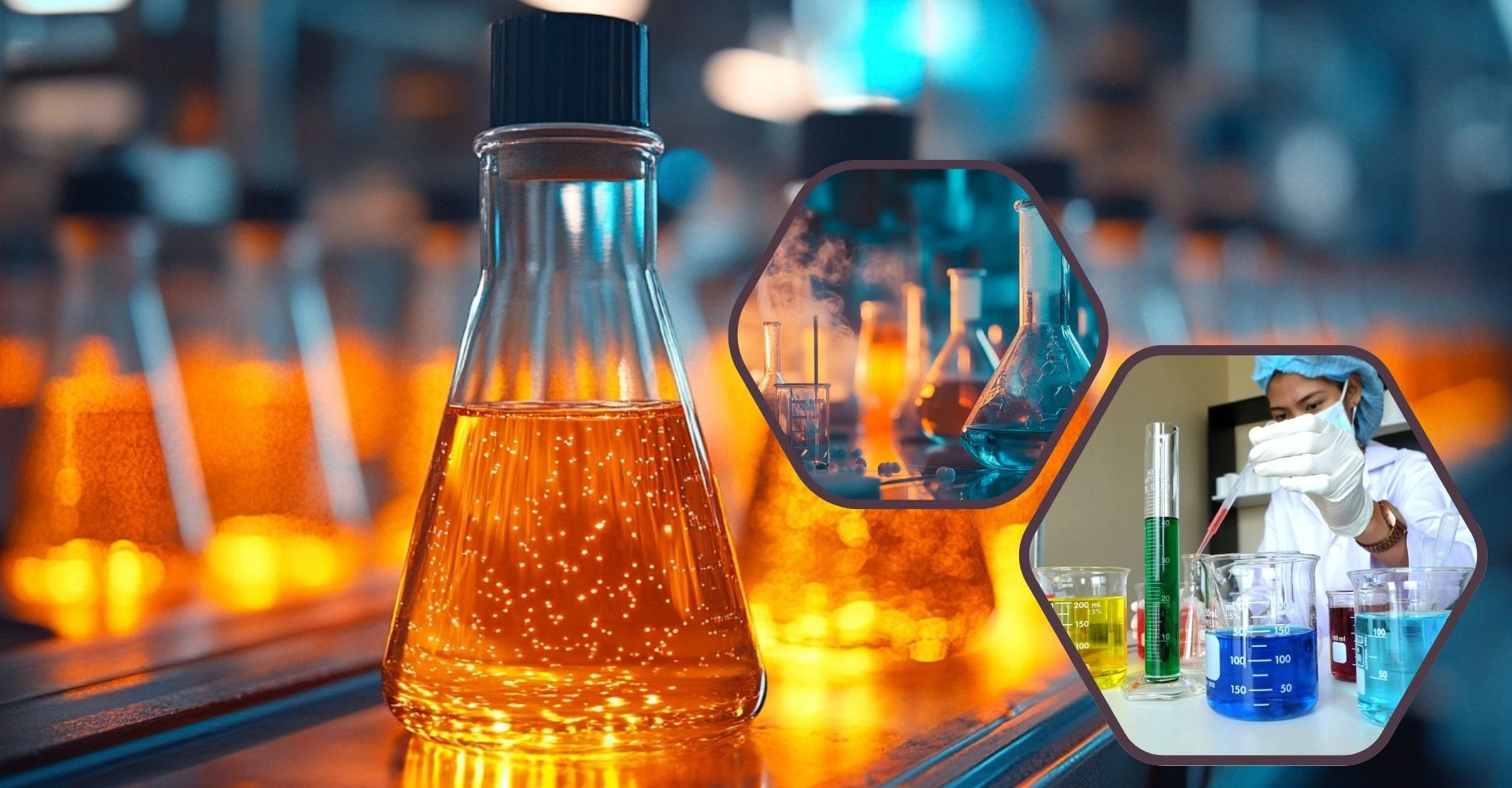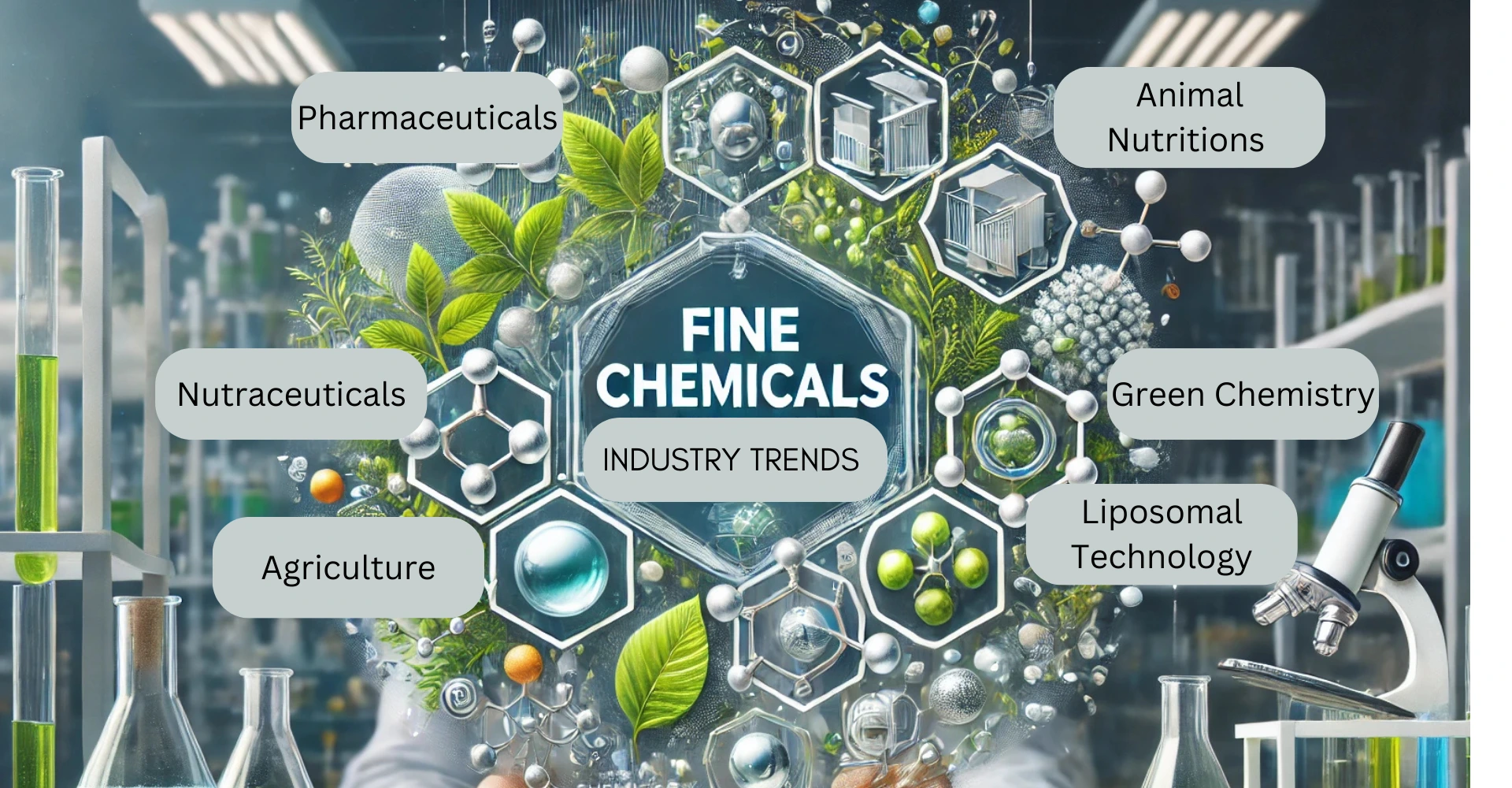De complete gids voor fijnchemicaliën: Kwaliteit, toepassingen en industrieën
Fijnchemicaliën zijn een essentieel onderdeel van de moderne wereld, ook al werken ze vaak achter de schermen. Het belang van fijnchemicaliën ligt in hun cruciale rol in moderne industriële processen en alledaagse producten vanwege hun hoge zuiverheid, specifieke formuleringen en precieze chemische structuren.
Van de medicijnen die we innemen tot de elektronische apparaten die we dagelijks gebruiken, fijnchemicaliën maken het allemaal mogelijk. In deze gids gaan we dieper in op het belang van fijnchemicaliën, hun brede scala aan toepassingen, de laatste markttrends en hun invloed op verschillende industrieën.
Het belang van fijnchemicaliën
Fijne chemicaliën onderscheiden zich door hun hoge zuiverheid en precisie bij de productie. In tegenstelling tot bulkchemicaliën, die in grote hoeveelheden worden geproduceerd en meer algemene doeleinden dienen, zijn fijnchemicaliën complex en worden ze in kleinere hoeveelheden geproduceerd met sterk gecontroleerde processen. Deze precisie maakt ze onmisbaar in industrieën die strenge kwaliteitsnormen vereisen.
Wat zijn fijnchemicaliën?
Fijne chemicaliën zijn enkelvoudige, zuivere chemische stoffen die in beperkte hoeveelheden worden geproduceerd. Ze hebben vaak een complexe samenstelling en dienen als bouwstenen voor een reeks hoogwaardige, gespecialiseerde producten.

Wat zijn de belangrijkste kenmerken van fijnchemicaliën?
Hoge zuiverheid: Fijne chemicaliën worden gezuiverd om onzuiverheden te verwijderen, zodat ze voldoen aan strenge kwaliteitseisen.
Specifieke toepassingen: Ze worden gemaakt voor precieze functies, zoals actieve ingrediënten in medicijnen of reagentia in laboratoriumtests.
Gecontroleerde productie: Geproduceerd met gecontroleerde processen om consistentie en effectiviteit te garanderen.
Voordat we dieper ingaan op het belang van fijnchemicaliën,lichten we eerst enkele voorbeelden van fijnchemicaliën toe:
Actieve farmaceutische ingrediënten (API’s):
Voorbeeld: IJzer-API’s, calcium-API’s, zink-API’s enz.
IJzer-API’s zijn onder andere ijzercitraat, ijzerbisglycinaat, ijzercarboxymaltose en ijzeraltol. IJzerisomaltoside, ijzerderisomaltose en meer.
In calcium-API’s – Calcium orotaat, calciumcitraat malaat, calcium propionaat, calcium pidolaat en meer.
Gebruik: In geneesmiddelen moeten API’s zuiver en nauwkeurig gedoseerd zijn om werkzaamheid en veiligheid te garanderen.
Precisie en kwaliteitscontrole: Fijne chemicaliën ondergaan strenge kwaliteitscontroles, zodat elke batch voldoet aan de strenge eisen van de industrieën die ze bedienen. Dit controleniveau is van vitaal belang voor gebieden als farmaceutica en elektronica, waar zelfs de kleinste onzuiverheid de prestaties van het eindproduct kan beïnvloeden.
Hoogwaardige producten: Vanwege hun zuiverheid en specifieke functies zijn fijnchemicaliën belangrijke componenten in de productie van hoogwaardige producten, van levensreddende medicijnen tot geavanceerde elektronische componenten. Daarom vereist de productie ervan technische expertise, geavanceerde apparatuur en aanzienlijke investeringen.
Toepassingen van fijnchemicaliën
Fijnchemicaliën zijn essentieel voor verschillende industrieën en spelen een fundamentele rol in de creatie van producten die ons dagelijks leven beïnvloeden. Hieronder staan enkele van de meest prominente toepassingen:
Farmaceutische industrie
De farmaceutische industrie is een van de grootste verbruikers van fijnchemicaliën. Ze worden gebruikt om actieve farmaceutische ingrediënten (API’s) en tussenproducten te maken, die essentieel zijn bij de ontwikkeling en productie van medicijnen. Of het nu gaat om een eenvoudige pijnstiller of een geavanceerd biologisch geneesmiddel, fijnchemicaliën zorgen voor kwaliteit en effectiviteit van medicijnen.
Nutraceutische industrie
Fijnchemicaliën zijn cruciaal voor de productie van hoogwaardige ingrediënten in nutraceutische producten, zoals vitaminen, aminozuren en antioxidanten, die voldoen aan strenge zuiverheidsnormen. Deze zorgen ervoor dat consumenten veilige, effectieve producten krijgen voor dagelijks welzijn.
Veel fijne chemicaliën helpen de biologische beschikbaarheid van voedingsstoffen in supplementen te verbeteren, wat betekent dat het lichaam ze effectiever kan opnemen en gebruiken. Dit maximaliseert de gezondheidsvoordelen voor consumenten. Het belang van fijnchemicaliën in de nutraceutische industrie is hier relevant.
Dankzij fijnchemicaliën kunnen nutraceutische bedrijven producten maken die gericht zijn op specifieke gezondheidsbehoeften, zoals ondersteuning van het immuunsysteem, hartgezondheid, hersenfunctie of gewrichtsverzorging. Dit helpt mensen oplossingen te vinden die zijn afgestemd op hun unieke welzijnsdoelen.
Van probiotica voor een gezonde darm tot omega-3 voor een gezond hart, fijnchemicaliën zijn van fundamenteel belang voor de ontwikkeling van gespecialiseerde producten die inspelen op de nieuwste gezondheidstrends van de consument.
Naarmate de vraag groeit naar producten die de natuurlijke gezondheid ondersteunen, vormen fijnchemicaliën de sleutel tot het creëren van veilige, betrouwbare supplementen die worden ondersteund door wetenschappelijk onderzoek. Dit betekent dat bedrijven nieuwe hoogwaardige nutraceuticals op de markt kunnen brengen die voldoen aan de moderne behoeften op het gebied van welzijn.
Cosmetica-, voedingsmiddelen- en drankenindustrieën
Naast farmaceutica en elektronica worden fijnchemicaliën ook gebruikt in de cosmetica-industrie, waar ingrediënten van hoge kwaliteit nodig zijn voor huidverzorging, make-up en persoonlijke verzorgingsproducten. In de voedingsmiddelen- en drankensector helpen fijnchemicaliën bij het conserveren van voedsel, het verbeteren van de smaak en het verpakken.

Markttrends van de fijnchemische industrie
De fijnchemische industrie is voortdurend in ontwikkeling. Naarmate technologische vooruitgang en wereldwijde verschuivingen de markt opnieuw vormgeven, is het belangrijk om op de hoogte te blijven van de belangrijkste trends die deze sector beïnvloeden.
Groei in farmaceutische producten
De vraag naar fijne chemicaliën in farmaceutica neemt toe, vooral met de opkomst van gepersonaliseerde geneeskunde en biofarmaceutica. Bedrijven zijn voortdurend op zoek naar efficiëntere, schaalbare productiemethoden om te voldoen aan de vraag van zowel massamarkt- als specialistische geneesmiddelen.
Duurzaamheid & Groene Chemie
De drang naar duurzaamheid heeft een significante impact gehad op de productie van fijne chemicaliën. Industrieën passen nu groene chemieprincipes toe om afval te verminderen, energieverbruik te verlagen en de ecologische voetafdruk van chemische processen te minimaliseren. Deze trend wordt aangestuurd door zowel regelgevende druk als de vraag van consumenten naar milieuvriendelijkere producten.
Globalisering en outsourcing
Veel bedrijven besteden de productie van fijne chemicaliën uit aan opkomende markten zoals China en India, waar de productiekosten lager zijn en de capaciteiten toenemen. Deze globalisering heeft nieuwe kansen gecreëerd voor bedrijven om hun activiteiten op te schalen en kosten te verlagen, maar het heeft ook vragen opgeroepen over de betrouwbaarheid van de toeleveringsketen en kwaliteitscontrole.
Opkomende markten en innovatie
Naast outsourcing worden opkomende markten ook belangrijke spelers in de fijnchemische industrie. Innovaties in biokatalyse, continue verwerking en andere geavanceerde technologieën zorgen voor efficiëntere en kosteneffectievere chemische productie. Deze ontwikkelingen helpen om te voldoen aan de groeiende wereldwijde vraag naar fijnchemicaliën.
Beste fijne chemicaliën geproduceerd door West Bengal Chemical Industries Limited
IJzercitraat:
Ferric citraat wordt gebruikt als bron van ijzer en ondersteunt de productie van rode bloedcellen en energieniveaus. Het is vooral nuttig in formuleringen voor personen met ijzertekorten, en biedt een goed verdragen alternatief voor traditionele ijzersupplementen.
IJzercarboxymaltose
Een niet-dieet, injecteerbare vorm van ijzer die in klinische settings wordt gebruikt om ernstige ijzertekorten te behandelen, vooral bij mensen die geen orale ijzersupplementen verdragen.
Liposomaal ijzer:
Deze innovatieve vorm van ijzer maakt gebruik van liposomale inkapseling om de absorptie te verbeteren en veelvoorkomende bijwerkingen, zoals maag- en darmklachten, te verminderen. Hierdoor is het ideaal voor mensen met een ijzertekort.
Liposomale vitamine C:
Liposomale vitamine C staat bekend om zijn immuunversterkende eigenschappen en biedt een hogere biologische beschikbaarheid dan gewone vitamine C. Dit betekent dat gebruikers een krachtiger antioxiderend effect krijgen, wat de immuunfunctie, de gezondheid van de huid en de algehele veerkracht tegen ziektes ondersteunt.
Liposomaal zink:
Zink is cruciaal voor de gezondheid van het immuunsysteem, wondgenezing en de gezondheid van de huid. Liposomaal zink verbetert de absorptie, waardoor het lichaam efficiënter profiteert van de beschermende effecten van zink.
Natriumbutyraat
Natriumbutyraat staat bekend om de ondersteuning van de darmgezondheid en wordt gebruikt om de spijsvertering te verbeteren en de darmflora in evenwicht te brengen. Het ondersteunt de bekleding van de darmen, wat essentieel is voor de algehele spijsvertering.
Calciumorotaat
Deze zeer biologisch beschikbare vorm van calcium wordt vaak gebruikt om de gezondheid van de botten te ondersteunen en kan voordelen bieden voor de spierfunctie en de gezondheid van het hart en de bloedvaten vanwege de efficiënte absorptie.
Calcium pidolaat
Met uitstekende oplosbaarheid wordt calciumpidolaat gebruikt in supplementen die gericht zijn op botgezondheid, met name gunstig voor oudere volwassenen die sterke botten willen behouden en het risico op osteoporose willen verminderen.
Elk van deze fijne chemicaliën brengt gerichte voordelen met zich mee voor nutraceutische producten, waardoor het voor consumenten gemakkelijker wordt om specifieke gezondheidsbehoeften aan te pakken met effectieve, hoogwaardige supplementen.
Industriële en fijne chemicaliën:
- Industriële chemicaliën: Deze worden op grote schaal geproduceerd en worden doorgaans gebruikt als grondstoffen voor andere industrieën, zoals productie, bouw en landbouw. Voorbeelden hiervan zijn zwavelzuur, ammoniak en chloor. Ze zijn minder gespecialiseerd, met een focus op grote volumes en lagere kosten in plaats van zuiverheid of precisie.
- Fijne chemicaliën: Geproduceerd op kleinere schaal met hoge zuiverheid, zijn fijne chemicaliën speciaal ontworpen voor industrieën die exacte formuleringen vereisen, zoals farmaceutica, nutraceuticals en cosmetica. Ze zijn afgestemd op specifieke moleculaire structuren en eigenschappen, ter ondersteuning van precieze toepassingen. Veelvoorkomende fijne chemicaliën zijn aminozuren, vitaminen, speciale polymeren en bioactieve verbindingen.
Conclusie
Concluderend zijn fijne chemicaliën fundamenteel voor veel hoogwaardige industrieën, waaronder farmaceutica, nutraceuticals, cosmetica, voedsel en elektronica. Hun hoge zuiverheid, precisie in formulering en gecontroleerde productie maken ze onmisbaar voor producten die strenge kwaliteitsnormen vereisen. Naarmate de vraag van consumenten groeit naar producten die prioriteit geven aan gezondheid, duurzaamheid en werkzaamheid, blijft de fijnchemische industrie zich aanpassen en omarmt ze groene chemie, globalisering en technologische innovatie.
Met toepassingen die variëren van het verbeteren van de opname van voedingsstoffen in supplementen tot het mogelijk maken van levensreddende medicijnen en geavanceerde elektronica, stimuleren fijnchemicaliën de vooruitgang in alle sectoren. Hun impact op ons dagelijks leven, hoewel vaak onzichtbaar, onderstreept het belang van voortdurende investeringen en onderzoek in de productie van fijnchemicaliën, waardoor kwaliteit, duurzaamheid en vooruitgang worden gewaarborgd als reactie op wereldwijde behoeften.
